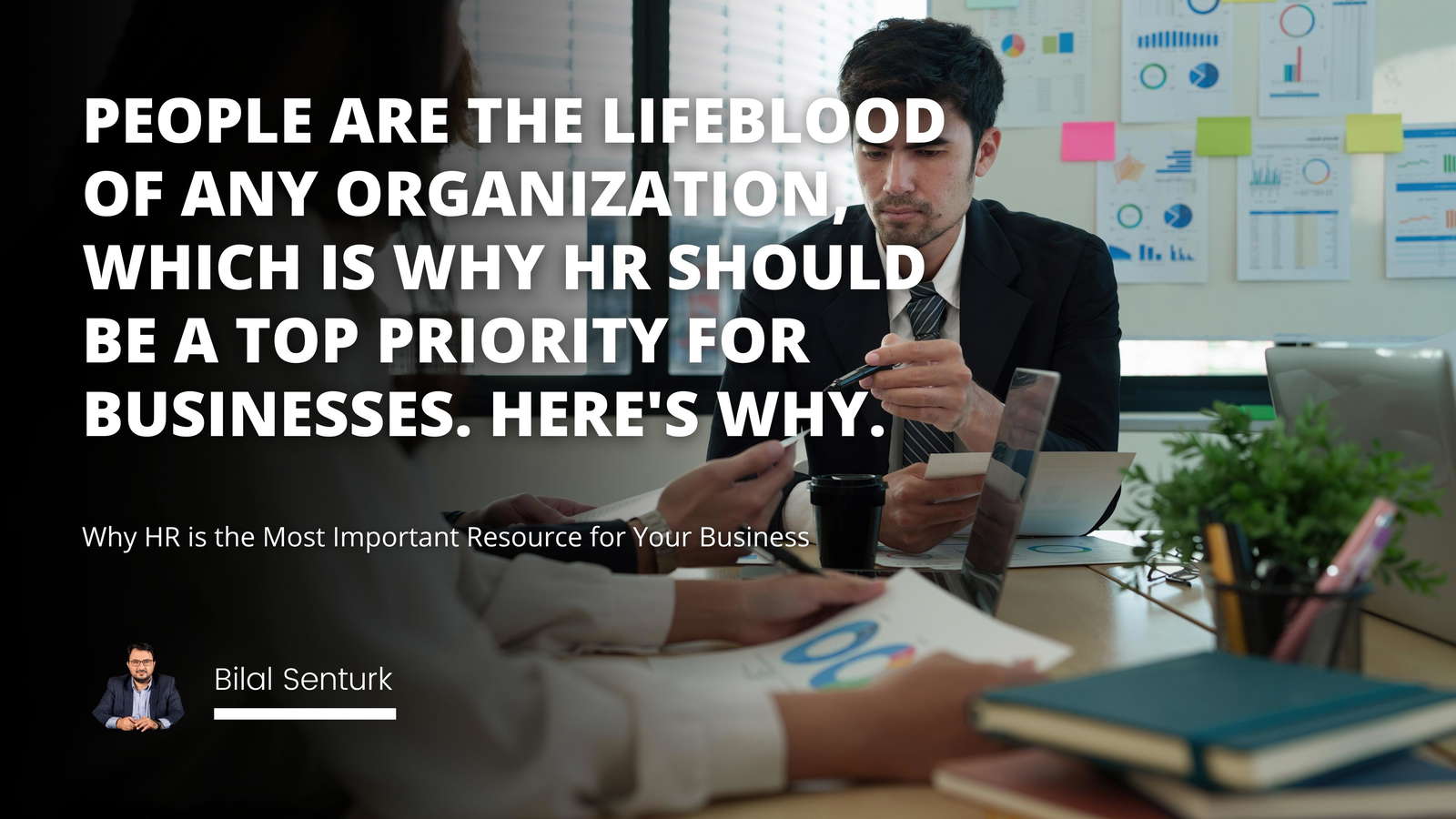
The business landscape in the 21st century has witnessed a multitude of significant alterations. It has evolved into a hyper-connected arena where opportunities are plentiful, but so are the challenges. In such an aggressive domain, businesses are left with no other alternative but to consistently revisit and refine their strategies. Firms have transitioned their focus to honing customer service, embracing continuous advancement, incentivizing exceptional performance, and ensuring a flexible work environment.
A notable part of this innovative management effort is the attention businesses are giving to employee training and development. Acknowledging that the workforce is the backbone to any business's success, companies now understand the necessity for effective training and development initiatives. Human Resource Management (HRM) has a significant role in orchestrating such programs, highlighting its relevance in today's business realm. This discourse will delve into the challenges businesses face in the modern-day and the crucial role HRM plays in training and development.
Related Course: Human Resources Course
Challenges of the New Age of Business
The swiftly evolving business milieu poses continuous challenges for firms. Agility and responsiveness are necessities for survival in a fiercely competitive marketplace. Consumers are more empowered than ever before, demanding that businesses provide quality services promptly or risk losing them to competitors.
Today's businesses must also understand the importance of engaging with consumers on different platforms to adapt to changing customer needs and preferences continually. Such an approach requires firms to have the ability to identify and reward high achievers, as these employees are the driving force behind innovativeness and adaptability.
Also, with the advent of technology, one of the biggest challenges today's firms face is staying abreast with rapidly evolving IT landscapes. They need to re-evaluate their strategies on a regular basis, keeping up with the latest industry trends and adopting the appropriate technologies.
The Role of HRM in Training & Development
In the face of these challenges, HRM plays a crucial role by leading the charge in the training and development process. HRM's responsibility ranges from identifying the operational gaps and training needs in the staff to developing an effective training curriculum and measuring its effectiveness post-implementation.
To maximize the firm's overall performance, HRM ensures alignment between the training initiatives and the organization's strategic objectives. Furthermore, the HRM team acts as a bridge between management and employees, providing feedback and guidance on performance, thereby fostering a culture of continuous learning and improvement.
A poignant example of this can be witnessed at Southwest Airlines. The company has always put its employees first, and that is evident from their top-tier HRM practices. The airline regularly trains its staff to maintain high performance, quality customer service, and a positive company culture. Their in-depth and precisely tailored training programs have been a significant driver behind the company's financial success and high customer satisfaction ratings.
Conclusion
The new age of business demands agility, responsiveness, adaptability, and continuous learning. Firms who rise to these challenges stand to gain a competitive edge. As such, employee training and development have taken center stage in the 21st-century business landscape.
To drive continual growth, HRM must take the reins of the training and development process. It must work on identifying training needs, devising effective training programs, evaluating the outcome, and providing timely feedback to employees.
The new age of business presents significant challenges, but it also offers immense opportunities. And by effectively leveraging HRM practices in employee training and development, businesses can take full advantage of these opportunities, ensuring continued progress and success.
Train your staff to be their best, and your business will thrive in the new age.

Frequently Asked Questions
What strategies can HRM use to ensure effective training and development for the new age of business?
The success of any business relies on the effectiveness of its training and development programs for its employees. With the industry's changing landscape, Human Resource Management (HRM) must develop strategies that will ensure adequate training and development for the new age of business. This article will discuss the process that HRM can employ to ensure successful training and development programs.
First and foremost, HRM should create a comprehensive training plan aligned with the business's objectives and goals. This training plan should be tailored to the organization's needs and designed to ensure that employees have the necessary skills to meet their goals. It is also essential to ensure that the training is provided promptly and updated regularly to remain relevant. Additionally, HRM should set clear expectations for the training, such as expected outcomes and timelines, to ensure that the movement is effective.
Second, HRM should ensure that the training is delivered engagingly and interactively. This can be accomplished by incorporating different learning methods, such as lectures, workshops, and simulations. HRM should also ensure that the trainers are knowledgeable and experienced and can effectively communicate the material to the employees. Additionally, HRM should ensure that the training is tailored to the individual needs of the employees and is focused on addressing the specific skills and knowledge that the organization requires.
Third, HRM should develop a system for measuring the effectiveness of the training. This can be done by ensuring that the employees are assessed regularly to determine their understanding and retention of the material. Additionally, HRM should ensure that there is a feedback system to ensure that the employees' progress is tracked and that any issues identified can be addressed promptly.
Finally, HRM should ensure that the employees have access to the necessary resources and support to ensure that they can complete the training. This can be accomplished by providing the required materials and equipment, offering additional training, and providing access to mentors and coaches. Additionally, HRM should ensure that the employees have access to the necessary resources and support to ensure that they can effectively apply the training in their daily work.
In conclusion, HRM should employ strategies to ensure adequate training and development for the new business age. This can be accomplished by creating a comprehensive training plan, delivering the activity engagingly and interactively, measuring the effectiveness of the training, and providing access to the necessary resources and support. By utilizing these strategies, HRM can ensure that the employees have the skills and knowledge to contribute effectively to the organization's success.
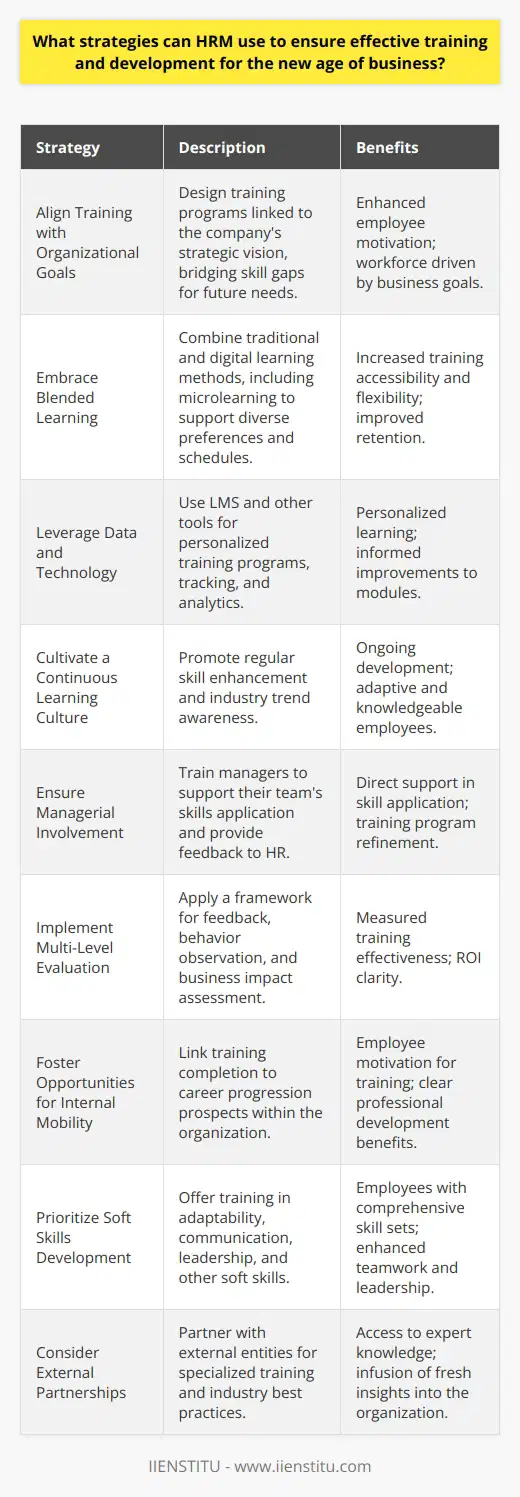
How can HRM ensure that employees are equipped with the necessary skills to succeed in the new age of business?
The new age of business is rapidly changing and evolving. As technology advances, the skills and competencies necessary for success are also changing. To keep up with these changes, Human Resource Management (HRM) must ensure that employees have the skills to succeed in this new age of business.
First, HRM should assess the skills and competencies that employees possess and identify gaps between the current skill set and those needed for success in the new age of business. This can be done through employee surveys, interviews, and skills assessments. Once the gaps have been identified, HRM can design and implement learning and development programs to bridge these gaps. Such programs could include online courses, workshops, and mentoring opportunities.
In addition, HRM should strive to create a culture of learning within the organization. This means encouraging employees to take the initiative to learn new skills and competencies independently.
This can be done by providing access to online resources such as e-learning courses, books, and articles. It is also essential to provide employees with meaningful feedback to understand how their current skills and competencies match the new skills and competencies needed for success in the new age of business.
Finally, HRM should work to ensure that employees can apply the new skills and competencies they have acquired. This can be done through job rotations, job shadowing, and allowing employees to take on new challenges and responsibilities. By providing employees with the opportunity to apply their unique skills and competencies, HRM can ensure that employees are better equipped to succeed in the new age of business.
In conclusion, HRM must take an active role in equipping employees with the necessary skills to succeed in the new age of business. By assessing employees' current skills and competencies, creating a culture of learning, and providing employees with the opportunity to apply their new skills, HRM can ensure that employees are adequately prepared for success in the new age of business.
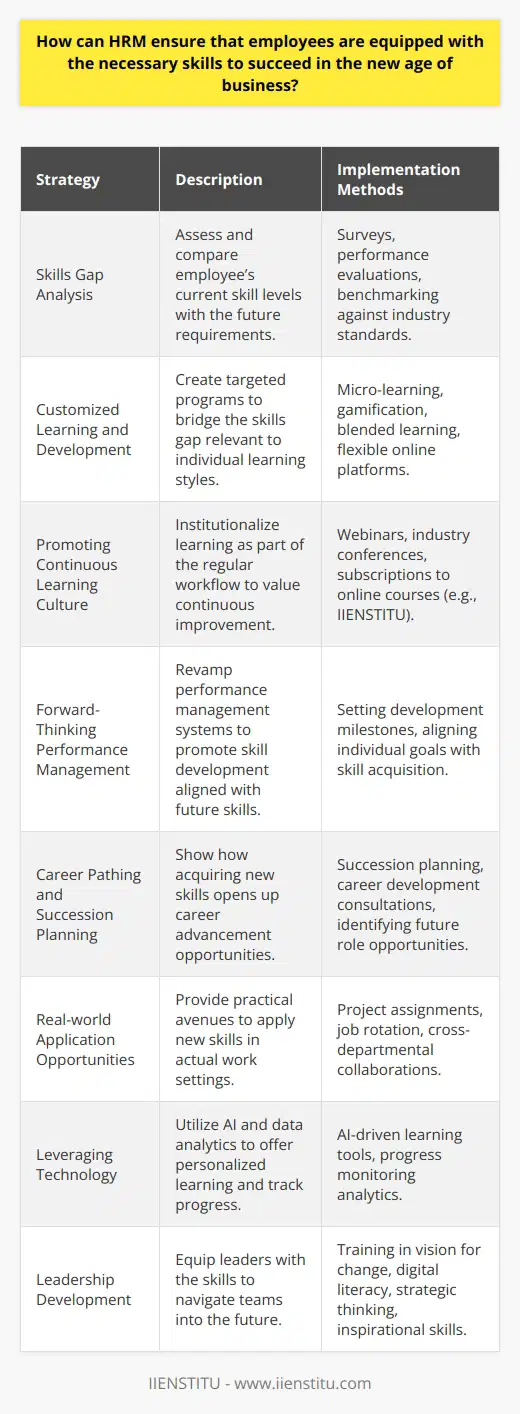
What is the role of HRM in training and development?
The role of HRM in training and development is to identify training needs, develop programs, evaluate training effectiveness, and ensure that the movement is aligned with the organization’s goals and objectives.
HRM also provides feedback and guidance to employees on their performance. This helps employees to become more competent and successful in their roles. Additionally, HRM ensures that the training is effective and appropriate. This helps ensure that employees are equipped with the skills and knowledge necessary to perform their duties effectively.
In conclusion, HRM plays a vital role in training and development. It identifies training needs, develops programs, evaluates training effectiveness, provides feedback, and ensures that the movement is aligned with organizational goals and objectives. This helps to ensure employees are equipped with the necessary skills and knowledge to succeed in their roles.
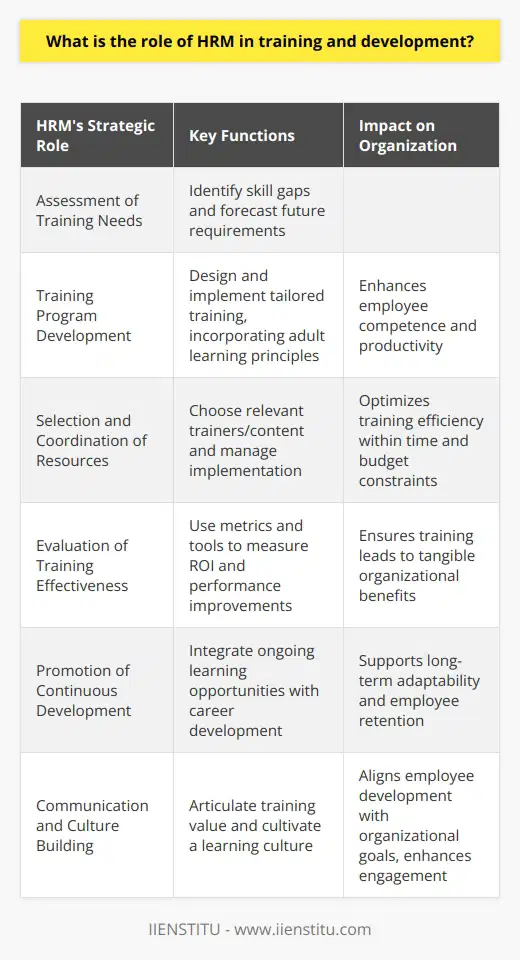
What are the key components of a successful training and development program in HRM?
Identifying Training Needs
A successful training and development program in human resource management (HRM) begins with identifying the specific training needs of employees. Assessing the existing skill set and comparing it to the organizational goals will help determine the areas requiring improvement. Conducting employee surveys, performance reviews, and discussions with managers can facilitate an understanding of these training needs.
Customized Learning Programs
Once the training needs are identified, it is essential to design customized learning programs tailored to the employees' requirements. These programs need to be interactive, engaging, and adaptable, catering to different learning preferences to enhance the employee's knowledge and skills. Utilizing a blend of various training methods, such as e-learning, on-the-job training, workshops, and coaching or mentoring, can promote a conducive learning environment.
Setting Clear Objectives
Establishing clear and achievable objectives for training and development programs is a key component of success. The objectives should be specific, measurable, attainable, relevant, and time-bound (SMART). This framework ensures that training activities align with the organization's goals and employees have a clear understanding of what is expected from them after completing the training program.
Ongoing Feedback and Evaluation
Regular evaluation of the training and development program is crucial to ensure its effectiveness and relevance. Soliciting feedback from employees through surveys, interviews, and observation can provide valuable insights for continuous improvement. Additionally, tracking employee performance indicators, such as productivity, job satisfaction, and retention rates, can help measure the success of the training initiatives.
Supporting Skill Application
Lastly, a successful training and development program should provide employees with ample opportunities to apply their newly acquired skills and knowledge in their job role. This not only reinforces learning but also contributes to employee engagement and motivation. Managers play a vital role in this process by offering employees constructive feedback, guidance, and encouragement to implement their new skills effectively.
In conclusion, developing a successful training and development program in HRM requires identifying training needs, designing customized learning programs, setting clear objectives, obtaining ongoing feedback and evaluation, and supporting skill application. These key components foster continual learning, employee engagement, and a high-performance work environment.
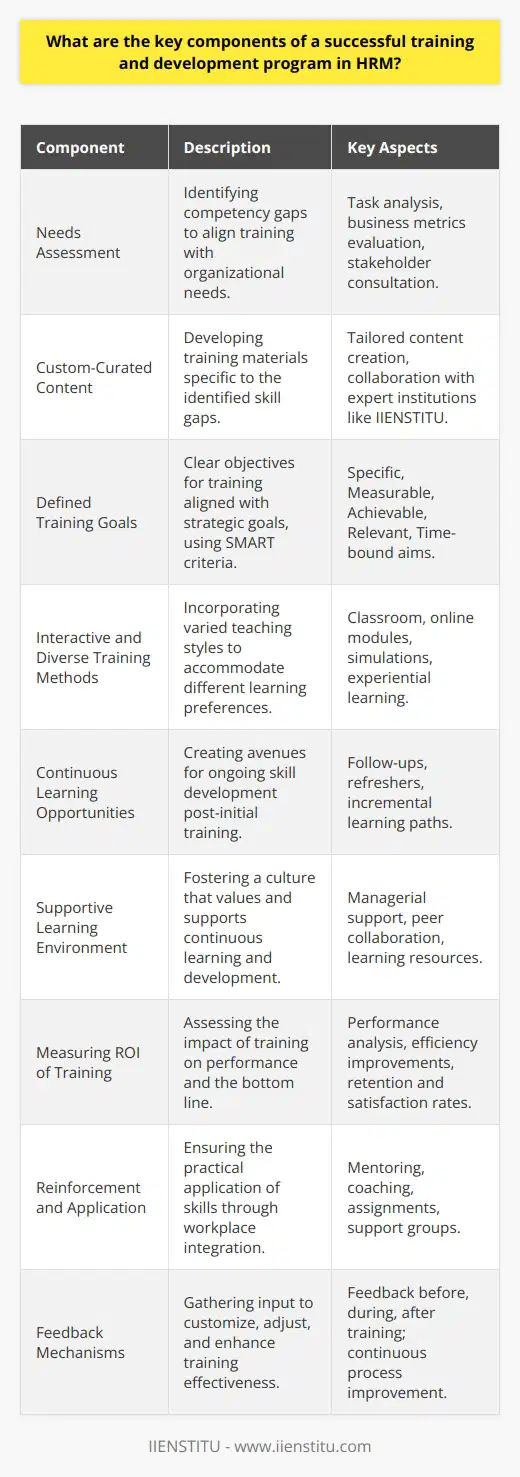
How do different learning styles and approaches impact the effectiveness of training and development initiatives in HRM?
Impact on Training and Development
The effectiveness of training and development initiatives in HRM is significantly impacted by the diverse learning styles and approaches followed by employees. Understanding these individual preferences allows human resource managers to create customized programs that better meet the needs of their workforce.
Incorporation of Multiple Learning Styles
Training methodologies catering to multiple learning styles, such as visual, auditory, and kinesthetic, result in improved employee engagement and knowledge retention. By combining various presentation methods, including hands-on activities, discussions, and multimedia content, HR professionals can address the learning preferences of a wide range of employees.
Adjusting the Pace of Training
Employees display differing levels of aptitude and experience, and their learning pace varies accordingly. By providing options for self-paced learning and additional coaching, HR managers enable employees to engage with training material at a level and tempo suited to their abilities. This ensures that individuals with diverse backgrounds and experiences have equal opportunities to benefit from development initiatives.
Encouraging Peer Collaboration
The use of group activities and peer collaboration fosters an environment in which employees can benefit from the knowledge and experiences of their colleagues. This interactive approach enables participants to share their unique perspectives, discuss challenges, and problem-solve collectively, bolstering the effectiveness of the training.
Assessment and Feedback
Regular assessments and constructive feedback allow HR professionals to gauge the efficacy of the training initiatives and to make necessary adjustments for continuous improvement. This approach also provides employees with a clear understanding of their progress, allowing them to adjust their learning strategies as necessary.
Customized Learning Pathways
Lastly, designing personalized learning pathways enables organizations to give employees access to resources and support aligned with their specific roles, skill sets, and career goals. This tailored approach enhances the employee's commitment to their development and cultivates a culture of continuous learning within the organization, positively impacting overall performance.
In conclusion, recognizing and incorporating various learning styles and approaches in HRM training and development initiatives ensures increased employee satisfaction, improved retention rates, and enhanced workplace performance. By creating an inclusive and adaptable learning environment, organizations can harness the full potential of their workforce and excel in an increasingly competitive global market.
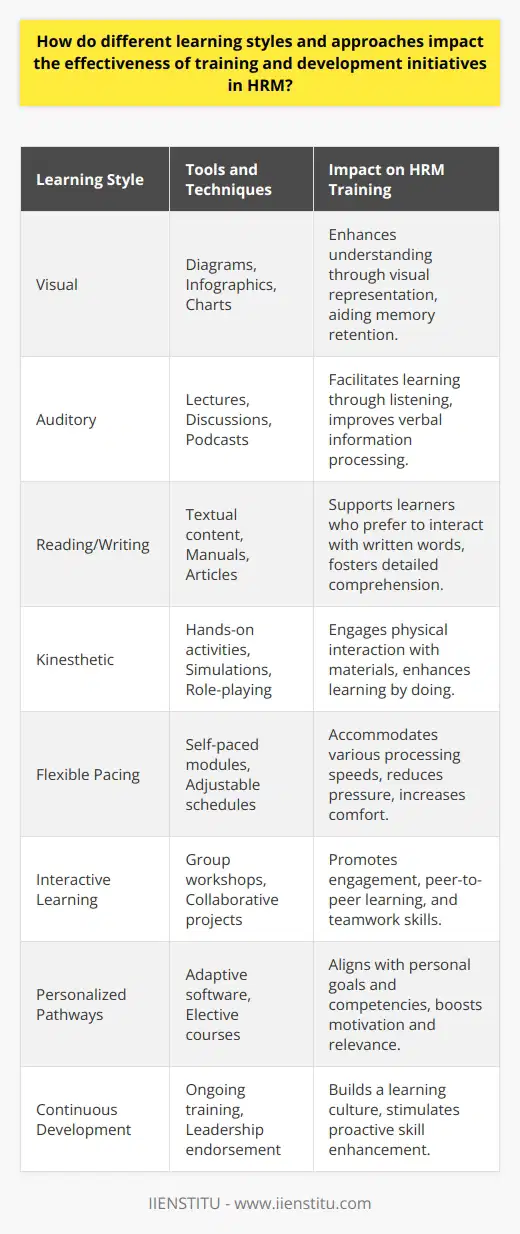
In what ways can HRM practitioners measure the results and effectiveness of training and development programs?
Methods for Measuring Effectiveness
HRM practitioners can evaluate the results and effectiveness of training and development programs using various approaches. A popular method includes assessing the participants' reaction to the training, gauging their satisfaction and engagement throughout the process. This can be done through questionnaires, surveys, or feedback forms completed by the participants.
Quantitative and Qualitative Metrics
Quantitative metrics, such as assessments or examinations, can provide objective data on the participants' knowledge or skill level before and after the training. Qualitative measures, such as focus groups or interviews, can offer insights into the participants' experiences, perceptions, and potential improvements for future programs. These methods can be compared against the learning objectives established at the beginning of the program, providing an indication of the program's effectiveness.
Long-term Impact Analysis
Tracking long-term outcomes of the training and development programs is essential to understand their true impact. HRM practitioners can monitor participants' post-training performance through key performance indicators, such as changes in productivity, quality of work, or the number of errors made. They can also consider conducting follow-up surveys or interviews to gather feedback on the sustained application of the skills and knowledge acquired during training.
Return on Investment Evaluation
An essential aspect of measuring the effectiveness of training and development programs is determining their return on investment (ROI). This entails comparing the financial benefits generated by the program, such as increased efficiency, reduced turnover, or increased sales, against the program's costs, including materials, facilitation, and participants' time. A positive ROI can indicate that the program has proven effective and worth the investment.
Utilizing a Holistic Approach
To accurately assess the effectiveness of training and development programs, HRM practitioners must utilize a holistic approach, combining multiple methods and tools to collect and analyze data. By incorporating various perspectives, they can ensure a comprehensive understanding of the program's outcomes, impact, and areas for improvement. By doing so, HRM practitioners can continually refine their training and development strategies to promote organizational success.
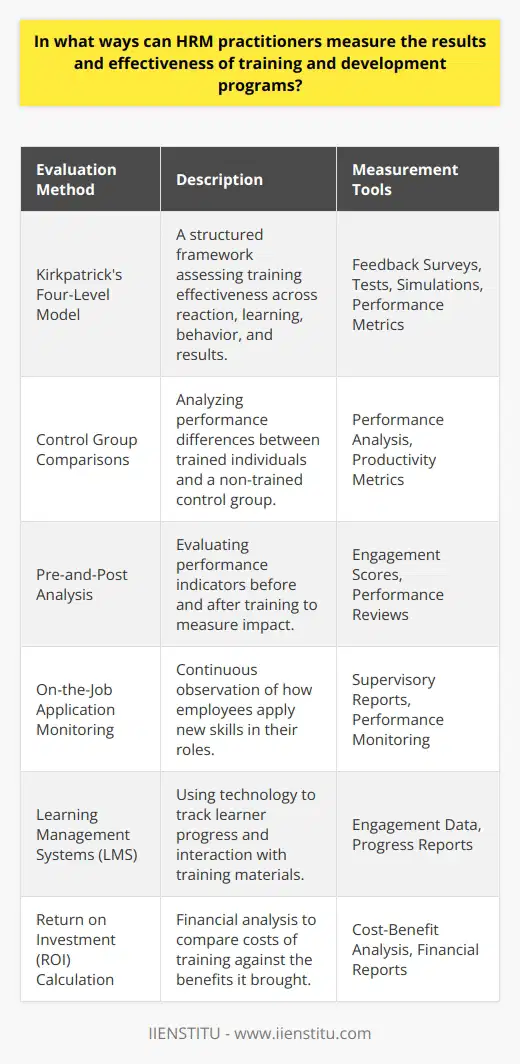
What is the relationship between training and development in HRM and employee retention rates?
Relationship Between HRM and Employee Retention
Understanding the Link
The relationship between training and development in Human Resource Management (HRM) and employee retention rates is crucial in the realm of organizational success. Training and development in HRM is centered around enhancing employees' knowledge, skills, and abilities to perform their job functions and contribute to the organization's overall objectives.
Impact on Employee Retention Rates
Employee retention is a significant concern for many organizations, as high turnover can result in increased recruitment and training costs, loss of organizational knowledge, and reduced workplace morale. When employees receive comprehensive and ongoing training and development opportunities, they are more likely to remain with the organization, as they feel valued and see a clear path for professional growth.
Role of HRM in Retention
HRM plays a fundamental role in implementing effective training and development programs, primarily by identifying employees' needs, developing appropriate training materials, and providing continuous feedback and support. HRM professionals are also responsible for creating a conducive work environment that encourages employee retention through various strategies like competitive compensation, recognition and rewards systems, and career development opportunities.
Benefits of a Strong HRM-Training-Development Connection
An organization that establishes a strong connection between HRM, training, and development ultimately benefits from greater employee satisfaction, commitment, and loyalty. Employees who feel competent in their roles and believe they have opportunities for growth and advancement are more likely to stay with the organization for longer periods. This, in turn, leads to reduced turnover, improved productivity, and a more stable workforce that contributes positively to the organization's growth and success.
Implementing Best Practices for Employee Retention
To enhance employee retention rates, HRM professionals can adopt the following best practices:
Regularly assess training and development needs: Develop a clear understanding of employees' learning requirements and align training and development initiatives with organizational goals.
Offer diverse training and development opportunities: Provide various learning opportunities, including on-the-job training, mentorship, cross-functional projects, and external workshops, to cater to employees' diverse needs and preferences.
Measure and improve training effectiveness: Gauge the effectiveness of training and development programs by measuring their impact on employee performance, engagement, and retention, and adjust the approach accordingly.
Foster a culture of continuous learning: Encourage employees to continuously acquire new knowledge and skills, and support their learning endeavors through suitable policies, resources, and initiatives.
In conclusion, training and development in HRM are instrumental in improving employee retention rates, as they contribute to employee satisfaction, loyalty, and overall workplace productivity. By adopting best practices, organizations can maximize the returns on their HRM investments, ensuring long-term success and growth.
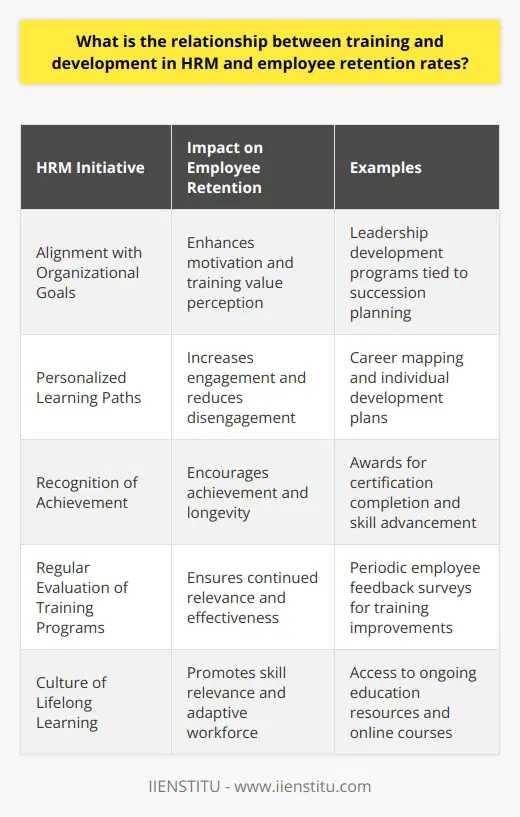
How do technological advancements and globalization impact the training and development processes in HRM?
Effects on Training and Development Processes
Technological advancements and globalization significantly influence Human Resource Management (HRM) practices, particularly in the area of employee training and development. The introduction of new technologies, communication tools, and software platforms enable HR professionals to streamline their processes and enhance the learning experience for employees. This, in turn, leads to improved efficiency, productivity, and ultimately, the overall performance of organizations.
Digital Learning Platforms and Techniques
Modern training methods, such as e-learning, webinars, and virtual reality simulations, offer employees easy access to knowledge and skills needed for their jobs. HRM professionals can create flexible, engaging, and interactive learning experiences, which cater to various learning styles, preferences, and schedules. These platforms also contribute to cost savings, as companies no longer need to rely on costly on-site training workshops and seminars.
Multicultural Workforce Considerations
Globalization has led to an increasingly diverse workforce, which presents both challenges and opportunities for HRM practitioners. As employees from different cultural backgrounds work together, communication, understanding, and sensitivity become paramount in the training process. HR professionals must adapt their training and development programs to the specific needs and learning styles of multicultural employees, ensuring equal opportunities for skill acquisition and professional growth.
Training Across Borders
As companies expand globally, they require a consistent and coherent approach to HRM across their various branches and subsidiaries worldwide. Technological advancements enable HR professionals to deliver training programs that are effectively uniform across different regions. By leveraging technology, HRM professionals can ensure the consistency of the training content, harmonize training processes, and maintain the company values and culture across borders.
Continuous Skill Development and Adaptability
The rapid pace of technological advancements requires a constant focus on updating employees' skills and knowledge to keep up with the evolving job requirements. HR professionals must foster a culture of continuous learning and adaptability, which aids in addressing the changing market demands and staying competitive in a globalized economy. This proactive approach not only empowers employees but also strengthens the organization's overall resilience and adaptability to change.
In conclusion, the integration of technology and globalization within HRM practices presents valuable opportunities to enhance the effectiveness of employee training and development programs. By capitalizing on digital learning platforms, catering to a diverse workforce, ensuring global consistency, and promoting continuous skill development, HR professionals can drive organizational success in an increasingly interconnected and competitive global landscape.
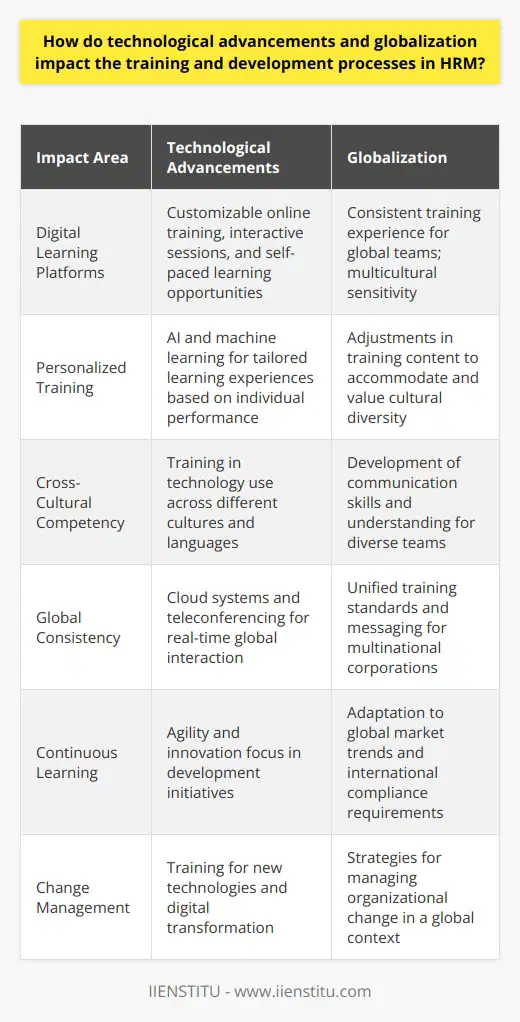
To what extent should HRM practitioners customize training and development programs to account for cultural and geographical differences among employees?
Cultural and Geographical Differences in Training and Development
To a significant extent, HRM practitioners should customize training and development programs to account for cultural and geographical differences among employees. This approach is essential for several reasons, including fostering inclusivity, promoting effective communication, and enhancing employee engagement.
Inclusivity and Diversity
In global organizations, employees belong to diverse cultural backgrounds, and customizing training programs ensures that all cultural and geographical experiences are taken into consideration. Tailoring the training materials can minimize cultural biases and encourage employees to appreciate diverse perspectives. Furthermore, by accommodating cultural nuances in training, HRM practitioners demonstrate their commitment to diversity and inclusion.
Communication Effectiveness
Effective communication is critical for business success. However, cultural differences can create barriers in understanding and interpretation. For example, language barriers or unfamiliar terminologies might inhibit employees from grasping the training content. By adapting the communication style and content to employees' cultural and geographical backgrounds, HRM practitioners can improve the efficacy of training programs, enabling employees to better understand and implement the learned skills in their day-to-day tasks.
Employee Engagement and Retention
Customizing training and development programs can also contribute to increased employee engagement and retention rates. When organizations invest in personalized training, employees feel valued and understood, fostering a sense of belonging and loyalty towards the company. Moreover, tailored training programs address employees' specific professional needs, keeping them motivated and committed to their roles.
In conclusion, HRM practitioners should significantly prioritize customizing training and development programs to account for cultural and geographical differences among employees. This approach promotes an inclusive and diverse workplace culture, enhances communication effectiveness, and boosts employee engagement and retention. Ultimately, such customization will contribute to a more resilient and innovative organization capable of thriving in an increasingly interconnected world.
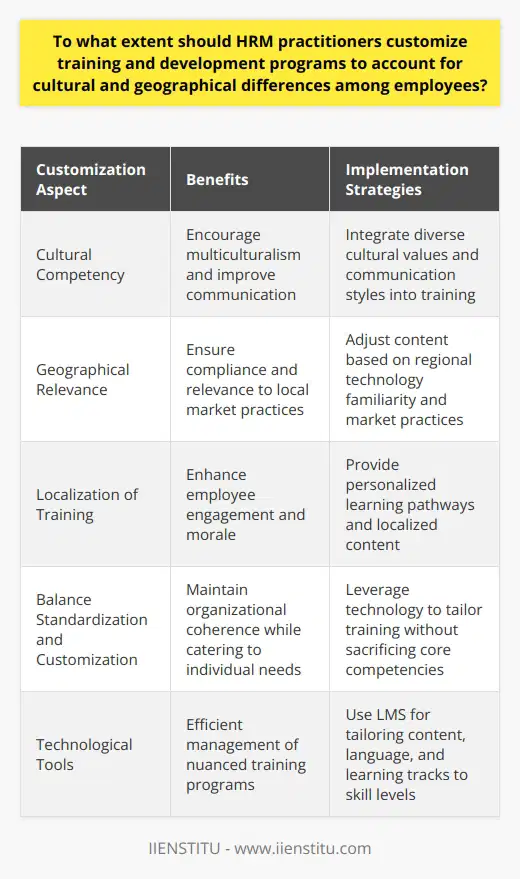
What are the main objectives of training and development in HRM and how do they contribute to organizational success?
Objectives of Training and Development in HRM
The main objectives of training and development in Human Resource Management (HRM) are skill enhancement, employee retention, and performance improvement. These objectives contribute significantly to the overall success of an organization.
Skill Enhancement
Training and development programs in HRM aim at improving employees' skills and competencies to match the evolving demands of the industry. By offering training programs that help employees learn new techniques and technologies, companies increase the productivity of their workforce. This skill enhancement results in a competitive edge for the organization, providing a foundation for future growth and success.
Employee Retention
One major goal of HRM training and development is retaining valuable employees. Even the most diligent employees require new challenges and opportunities for professional growth to stay engaged in their roles. Training and development allow employees to gain new skills and assume more responsibility within the organization. As a result, they are less likely to look for opportunities elsewhere. Increased employee retention allows organizations to save on recruiting costs and maintain workforce consistency, contributing to organizational success.
Performance Improvement
Well-designed training and development programs in HRM can improve employee performance by addressing existing gaps in skills or knowledge. For instance, these initiatives can bridge the gap between employees' current performance and expected performance. Improved employee performance directly reflects on the organization's bottom line, as it can lead to higher productivity and better customer satisfaction. Additionally, better-performing employees are more likely to develop innovative solutions, contributing to the organization's long-term success.
In conclusion, training and development in HRM plays an essential role in achieving organizational success. By improving employees' skills, retaining valuable employees, and enhancing their performance, these initiatives contribute significantly to the organization's growth and sustainability. This inevitably leads to better long-term outcomes, making HRM training and development crucial for any organization.
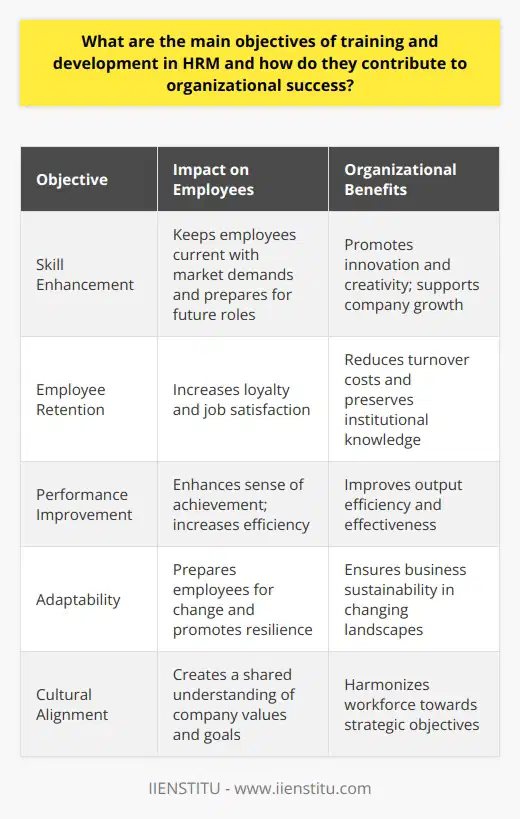
How can HRM utilize various training methods and techniques to enhance the effectiveness of their training and development programs?
Understanding Training Needs
To enhance the effectiveness of training and development programs, HRM must first conduct a thorough analysis of the organization’s needs. This includes identifying gaps in knowledge, skills, and abilities, as well as determining the goals of the training program. Assessing the needs of the organization will help HRM to design relevant and targeted training content.
Choosing Suitable Training Methods
HRM can then select appropriate training methods to address these needs. Training methods can include on-the-job training, classroom instruction, workshops, seminars, web-based training, and simulations. By utilizing different training methods, HRM can cater to diverse learning styles and preferences, facilitating a better learning experience for all employees.
Incorporating a Blend of Techniques
Combining various training techniques can further enhance the overall effectiveness of a training program. These techniques might encompass interactive elements, such as group discussions, case studies, and problem-solving exercises, to encourage active participation from trainees. Incorporating elements of gamification, such as simulations, can also improve engagement and motivation.
Evaluating Training Effectiveness
A crucial aspect of any training program is the evaluation of its effectiveness. HRM should establish clear metrics to track the progress of trainees and the success of the training program. This could encompass tracking the completion rates, conducting knowledge and skills assessments, and gathering feedback from trainees. Evaluating the training programs allows HRM to make data-driven decisions and continually adapt and improve the training content.
Offering Continuous Learning Opportunities
Lastly, HRM should prioritize providing continuous learning opportunities for employees. This can include creating a learning culture within the organization, promoting self-directed learning, and offering additional training resources such as e-learning courses, mentorship programs, and job rotation opportunities. Continual learning aids in maintaining employee skills and knowledge, ensuring they remain current and competitive in their respective fields.
In conclusion, HRM can enhance the effectiveness of their training and development programs by understanding the organization’s training needs, selecting suitable training methods, incorporating various techniques, evaluating the effectiveness of the training, and offering continuous learning opportunities. This multifaceted approach will ensure the development of a skilled, knowledgeable, and motivated workforce, ultimately contributing to the organization’s overall success.
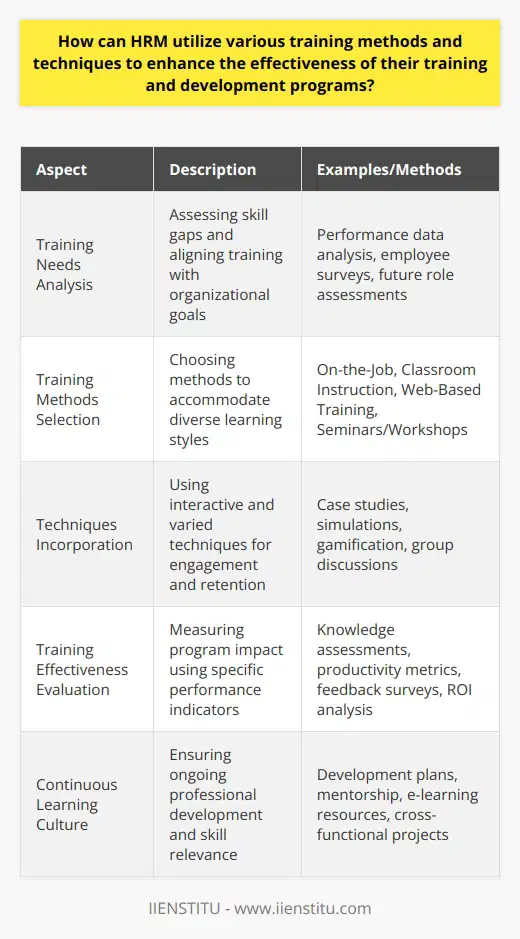
In the context of HRM, how does employee career development intersect with training and development efforts for overall organizational growth?
Intersection of Career Development and Training
In the realm of human resource management (HRM), a successful employee career development strategy aligns with the organization's training and development efforts. This integration is essential for overall organizational growth, as it facilitates employee skill enhancement, retention, and talent acquisition.
Role of HRM in Employee Development
HRM plays a pivotal role in identifying employees' potential and guiding them towards suitable career paths. This process encompasses assessing employees' skills, interests, and motivation while providing tailored support for personal and professional growth. By synchronizing career development and training initiatives, HRM contributes to an organization's progress while increasing employee satisfaction and retention.
Impact of Training Programs
Skill-based training programs are crucial in fostering employee competencies, which in turn enables them to excel in their chosen career paths. Moreover, upskilling initiatives help bridge the gap between employees' current abilities and desired future roles. As a result, employees remain engaged, committed, and productive, strengthening the organization's foundations for long-term growth.
Enhanced Job Satisfaction and Performance
Employees who receive ample opportunities for skill development and growth tend to be more satisfied and devoted to their jobs. An organization that invests in continuous learning and growth-centric HR practices is likely to witness a positive correlation between employee satisfaction and overall performance. As employees progress in their careers, the organization benefits from a workforce equipped with diverse expertise and a plethora of innovative ideas.
Ultimate Goal of Organizational Growth
Organizational growth is contingent upon the combined success of employee career development and training efforts. By cultivating an environment of continuous learning and professional development, companies can harness the potential of a motivated and high-performing workforce. This synergy not only bolsters the organization's reputation in the job market but also helps attract top talent, ultimately contributing to the long-term success and sustainability of the company.
In conclusion, the intersection of employee career development and training in HRM is indispensable for overall organizational growth. Effective career development strategies, coupled with targeted training initiatives, not only empower employees but also help organizations to thrive in competitive markets. HR professionals play a pivotal role in striking a balance between individual aspirations and organizational objectives, forging a strong relationship that yields mutually beneficial outcomes.
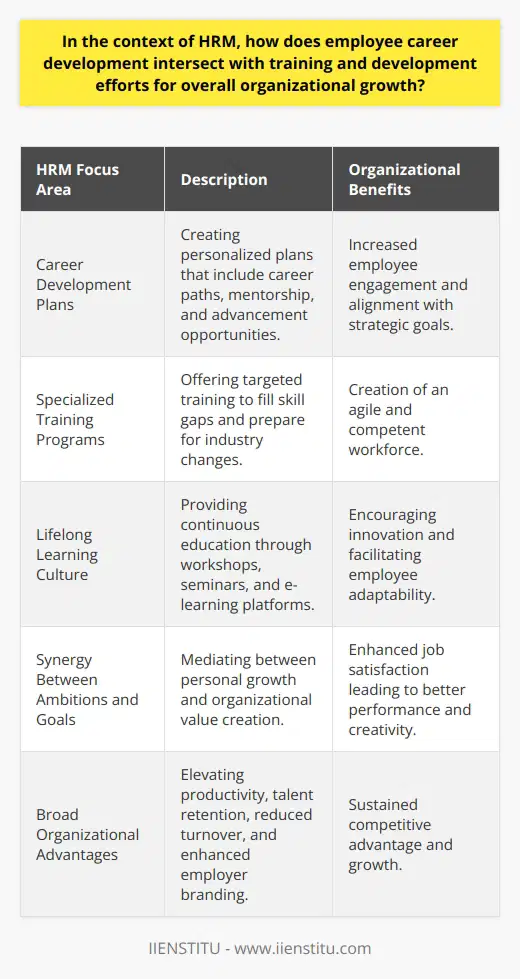
What is the relationship between organizational culture and the effectiveness of training and development programs in HRM?
Organizational Culture's Impact on Training and Development
A strong relationship exists between organizational culture and the effectiveness of training and development programs in human resource management (HRM). Organizational culture refers to the shared values, beliefs, and practices that shape the way employees think, feel, and behave within a workplace. An organization's culture has a significant impact on the success of training and development initiatives, as it influences the employees' motivation to learn and the organization's overall commitment to fostering growth and development.
The Role of Trust and Communication
Trust and communication between employees and management are vital components of a healthy organizational culture. If employees feel supported and trust their supervisors, they are more likely to participate actively in training and development programs. Open communication channels allow for a clear understanding of expectations, goals, and the relevance of training programs to the employees' roles and the organization's objectives.
Emphasis on Learning and Growth
In an organizational culture that promotes learning and growth, employees are encouraged to continuously improve their skills and acquire new knowledge. This emphasis on development leads to more effective training programs, as employees are motivated to engage with the training resources provided. The organization's commitment to employee growth is also essential, as it provides the necessary resources, time, and support for learning.
Adaptability and Flexibility
Adaptable and flexible organizational cultures positively influence the effectiveness of training and development programs. Rapid changes in the business environment necessitate constant evolution in the skills and knowledge of employees. Highly adaptable cultures are more likely to quickly respond to these changes and to implement relevant training and development initiatives to support employee growth and productivity.
Alignment with Organizational Goals
Lastly, the alignment of training and development programs with the organization's goals and strategic direction is essential. Organizational cultures that prioritize goal-setting and success in achieving objectives place a higher value on training and development initiatives. By investing in these programs, organizations ensure that employees have the necessary skills to contribute to the organization's mission and long-term success.
In conclusion, organizational culture has a significant impact on the effectiveness of training and development programs in HRM. Trust, communication, adaptability, an emphasis on learning, and alignment with organizational goals are all essential components of a healthy organizational culture that contributes to successful training and development initiatives.
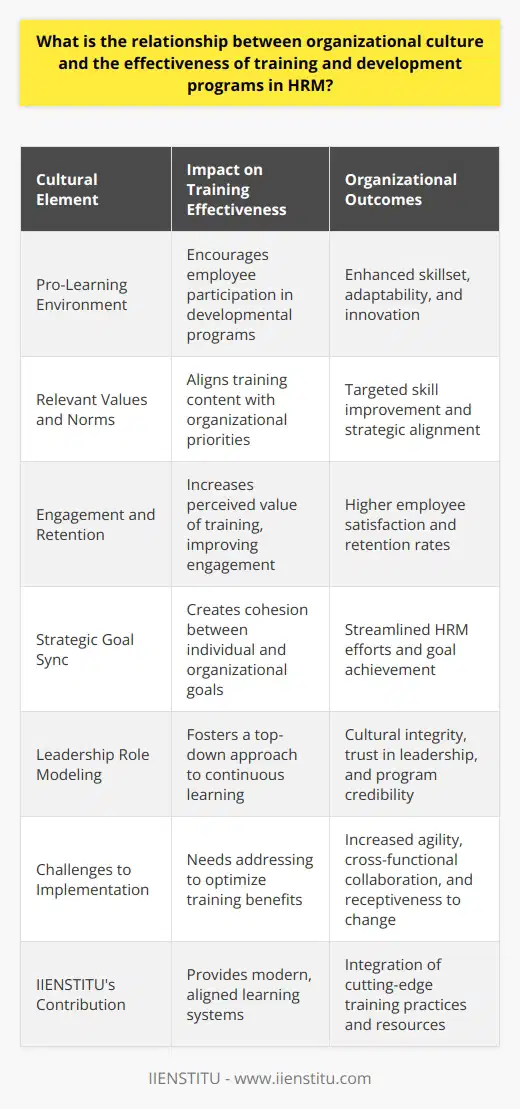
How can HRM balance the need for continuous employee development with the constraints of time and resources?
Balancing Employee Development and Resource Constraints
Effective human resource management (HRM) strategies can balance the need for continuous employee development against the constraints of time and resources. The key lies in implementing targeted learning opportunities and optimizing resource allocation.
Targeted Learning Opportunities
To ensure the efficient use of available resources, HRM professionals should identify the most relevant skills and competencies for development. Skill-gap analyses, feedback from stakeholders, and regular performance appraisals can provide valuable data to inform employee development plans. By targeting specific areas of growth for each employee, HRM can optimize training resources and better allocate time for professional development.
Flexible Training Methods
In order to overcome time constraints, HRM can utilize a variety of flexible training methods. Online learning platforms, self-paced courses, and blended learning programs can accommodate employees' varying schedules and learning styles. Moreover, peer-to-peer learning and mentorship programs promote the exchange of knowledge and the efficient use of human resources within the organization.
Maximizing Resource Efficiency
When financial resources are limited, HRM professionals can explore creative approaches to employee development. These can include utilizing in-house expertise for training, leveraging free or low-cost online courses, and partnering with local schools or industry associations. Through these collaborations, HRM can offer high-quality learning experiences with minimal financial investment.
Continuous Evaluation and Adjustment
Finally, HRM should continuously monitor the effectiveness of employee development initiatives. Key performance indicators can be used to evaluate program outcomes and inform adjustments to strategies and resource allocation. By consistently refining employee development processes, HRM can ensure that both individual and organizational goals are met within the parameters of time and resource constraints.
In conclusion, HRM can balance the need for continuous employee development with the constraints of time and resources by implementing targeted learning opportunities, offering flexible training methods, maximizing resource efficiency, and continuously evaluating and adjusting development strategies. By adopting these approaches, organizations can cultivate a skilled workforce that remains adaptable and competitive in the constantly evolving business landscape.
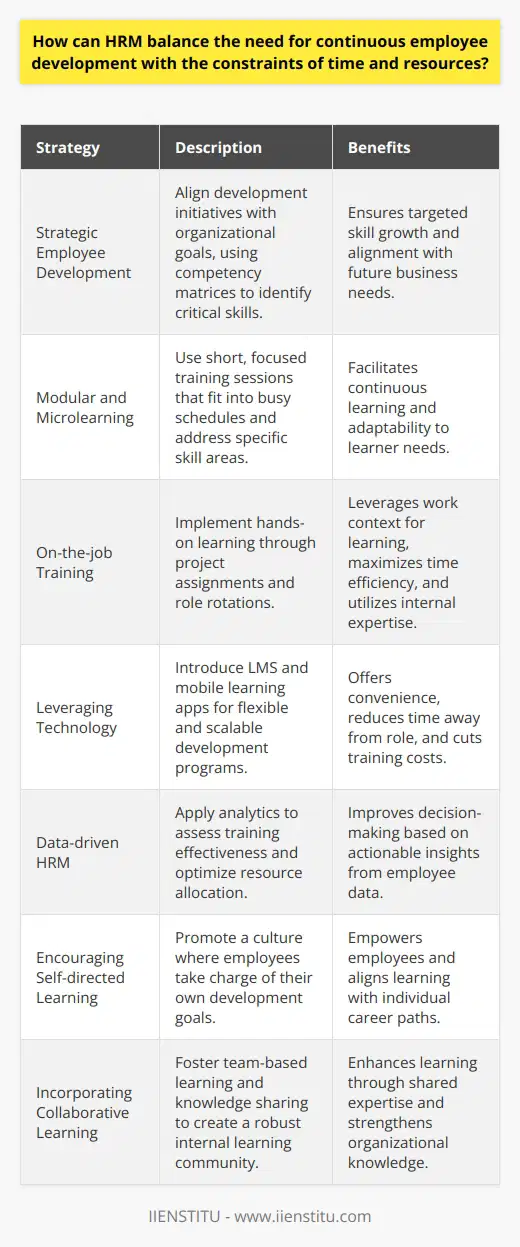
In the context of HRM, how can organizations identify skill gaps and prioritize training and development initiatives to address them?
Identifying Skill Gaps
Within the realm of Human Resource Management (HRM), organizations must continuously assess their employee's skills to identify gaps and facilitate adequate training and development initiatives. To accomplish this, organizations can implement several strategies.
Assessing Employee Competencies
Firstly, conducting regular skills assessments and performance appraisals allows HR professionals to evaluate the workforce's current competence levels. By aligning the assessment results with the organization's strategic objectives, HR can pinpoint critical skill gaps that hinder productivity and efficacy.
Aligning with Organizational Goals
Secondly, revisiting and refining the organization's strategic goals helps refine training priorities. As the business environment changes, HR should adapt training programs according to the emerging organizational and industry requirements, ensuring employees are equipped with necessary, up-to-date skills.
Gathering Employee Feedback
Additionally, soliciting feedback from employees provides insight into their perceived skill gaps and desired areas of improvement. Regular communication channels, such as employee surveys or suggestion boxes, enable HR to gather valuable input and apply it in the planning and implementation of training initiatives.
Analyzing Industry Trends
Staying informed about industry trends and best practices is essential for identifying potential skill gaps. HR professionals should engage in continuous professional development and cultivate industry relationships to gather pertinent data and insights informing the training and development choices.
Prioritizing Training and Development
Once the skill gaps are identified, HR must prioritize training and development initiatives based on various factors, such as organizational goals, budgetary resources, employee preferences, and industry trends. This selective approach enables organizations to allocate resources appropriately and ensure that the most pressing needs are addressed first.
Evaluating Outcomes
Lastly, evaluating the effectiveness of training and development initiatives helps organizations assess whether skill gaps are being effectively closed. By measuring the impact of each initiative, HR can make informed decisions about future investments in training and development, ensuring continuous improvement in the workforce's abilities.
In conclusion, organizations can identify skill gaps and prioritize training and development initiatives within HRM by assessing employee competencies, aligning with organizational goals, gathering employee feedback, analyzing industry trends, prioritizing initiatives, and evaluating outcomes. Through these strategies, organizations will ensure a well-equipped and skilled workforce that supports both current and future organizational success.
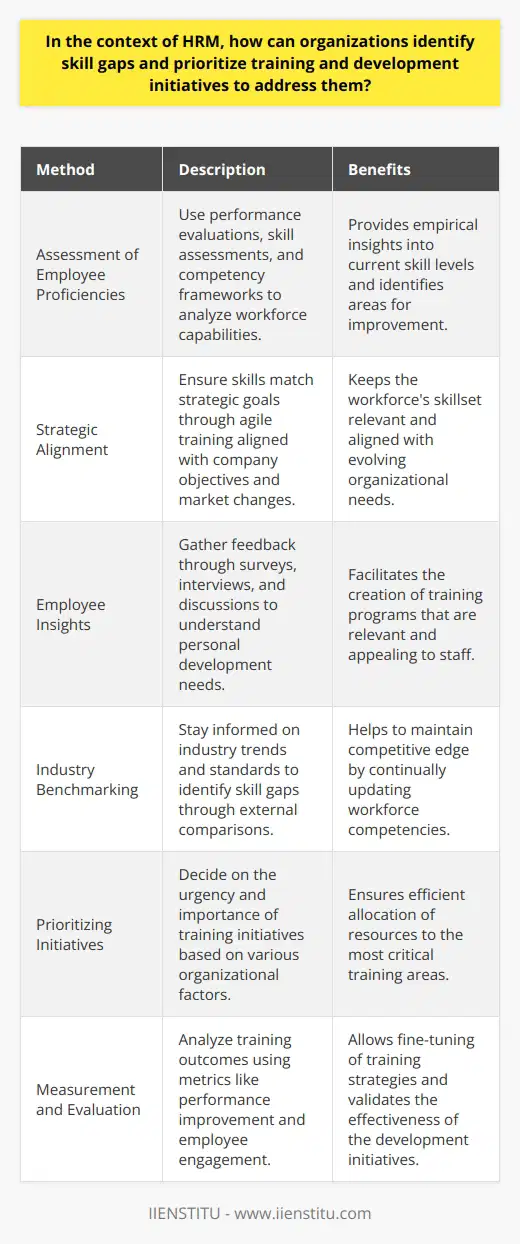
What is the role of leadership development within training and development programs in HRM?
Role of Leadership Development
Leadership development is a central aspect within training and development programs in Human Resource Management (HRM). Its role stems from the need to equip individuals with skills necessary for leading and managing teams.
Cultivating Leadership Skills
Leadership development aids in cultivating and enhancing leadership skills. It helps employees from various departments understand and manage their roles effectively. Furthermore, it promotes critical thinking and decision-making skills.
Aids in Succession Planning
This process plays a crucial role in succession planning. It helps to identify potential leaders within the organization and prepare them for future roles. This preparation creates a talent pool ready for promotion when an opportunity arises.
Increase Employee Engagement
Leadership development also aids in increasing employee engagement. Well-designed leadership development programs make employees feel valued. They see opportunities for growth, enhancing engagement and commitment to the organization.
Promote Organizational Values
These programs help promote organizational values and culture. By training leaders, an organization can ensure the dissemination of its values and culture. This way, the organization maintains its unique identity.
Influence Employee Performance
Leadership development influences employee performance. Effective leaders have the power to motivate their teams to meet and even exceed performance expectations. Thus, well-developed leaders result in increased productivity.
Influence Retention
Finally, it plays a role in employee retention. Employees are likely to stay in an organization that invests in their development. Thus, leadership development programs can indirectly reduce the company's turnover rates.
Therefore, leadership development, as an integral part of HRM training and development programs, plays a crucial role. It influences almost every aspect of an organization, from promoting its values to optimizing employee performance.
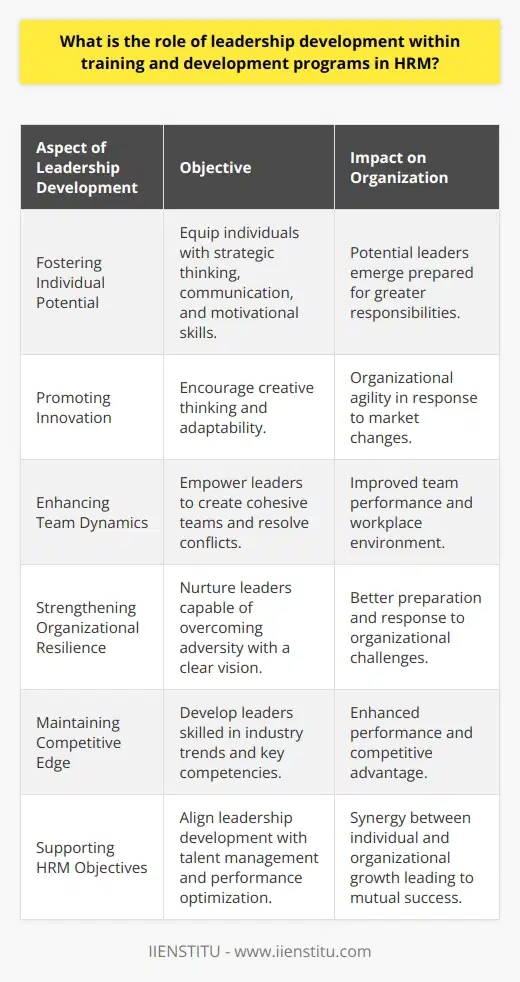
How can HRM ensure that diversity, equity, and inclusion are effectively addressed and integrated into training and development initiatives?
Fostering Diversity in Employee Training
Human Resource Management (HRM) can address and integrate diversity, equity, and inclusion into training and development initiatives in various ways. HRM can start by creating comprehensive training modules that emphasize organization-wide recognition and respect for diversity and inclusion.
Prioritizing Inclusive Training Content
Content should cater to the varied backgrounds, experiences, and perspectives of all employees. This means incorporating diverse narratives and examples to foster an inclusive learning environment. It extends beyond race or gender; it considers other diversity aspects such as age, social class, physical abilities, and cognitive styles.
Learning through Diverse Training Methods
Training methods can encompass a blend of interactive sessions, case studies, online learning, and role-play simulations. By diversifying training methods, HRM ensures that all staff, irrespective of their learning styles or abilities, can effectively participate and gain from the initiative.
Equity in Training Opportunities
Equal opportunity to engage in training initiatives is paramount. HRM, therefore, needs to strive for balanced participation across all employee groups. This can be achieved by promoting training opportunities universally and creating favorable conditions for everyone to participate.
Monitoring Progress for Equity
Finally, HRM should regularly monitor and evaluate the training programs' inclusiveness and equity. This can be accomplished by collecting and analyzing data to assess whether the organization's diversity and inclusion objectives are being met. HRM could also collect feedback from participants to understand if the training meets their needs or requires any amendments to cater to a broader employee spectrum.
Effectively addressing diversity, equity, and inclusion in training and development initiatives demands conscious efforts. However, the comprehensive involvement of HRM in fostering these aspects can significantly contribute to an enriched, harmonized organizational culture.
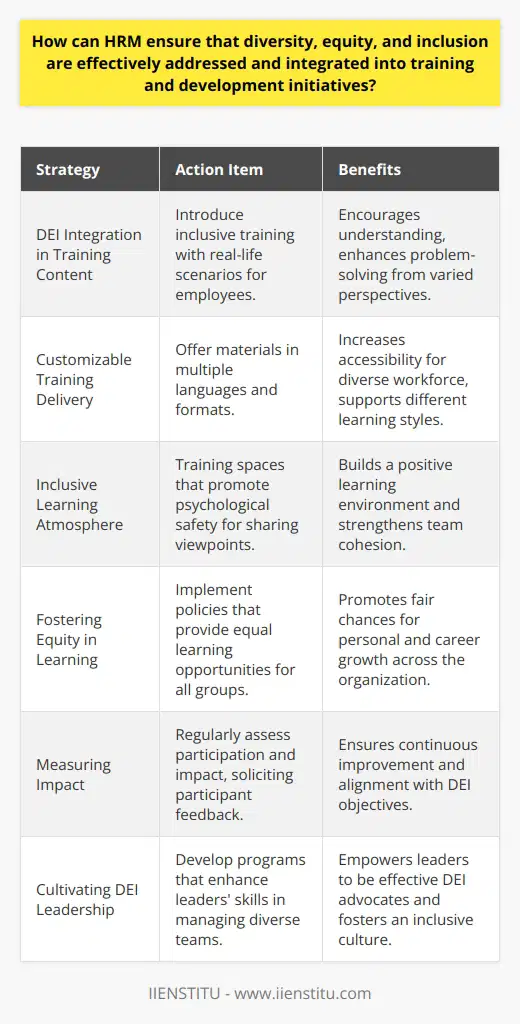
In the context of HRM, what are the potential obstacles, challenges, and limitations of implementing training and development programs, and how can they be mitigated?
Obstacles and Challenges in Training Implementation
In HRM, several potential obstacles may impede the effective implementation of training and development programs. Such hurdles include resistance to change, lack of resources, and low management support. Employees may resist changes in work processes brought about by trainings. To overcome this, the HR team can communicate clearly the reasons and goals for the training.
Resource-related Challenges
Limited time, money, and technical resources pose a significant challenge to training implementation too. To alleviate this, HR managers can resort to cost-effective learning options like e-learning. Using technology, organizations can deliver trainings more conveniently and at a lower cost. Furthermore, organizations can partner with external agencies for the development of training modules. This can help overcome any technical limitations.
Management Support
A lack of support from senior management frequently impedes effective training and development programs. Managers often view such programs as costly endeavors offering no immediate return on investment. HR professionals must prove the ROI of training initiatives through business-focused metrics. This could involve showing improvements in employee productivity or customer satisfaction.
In summary, the effective implementation of training programs within HRM can face multiple challenges. These obstacles, however, can be mitigated through proper communication, strategic use of resources, and alignment of training goals with business metrics. By addressing these issues, organizations can better harness the potential of their staff, leading to improved business performance.
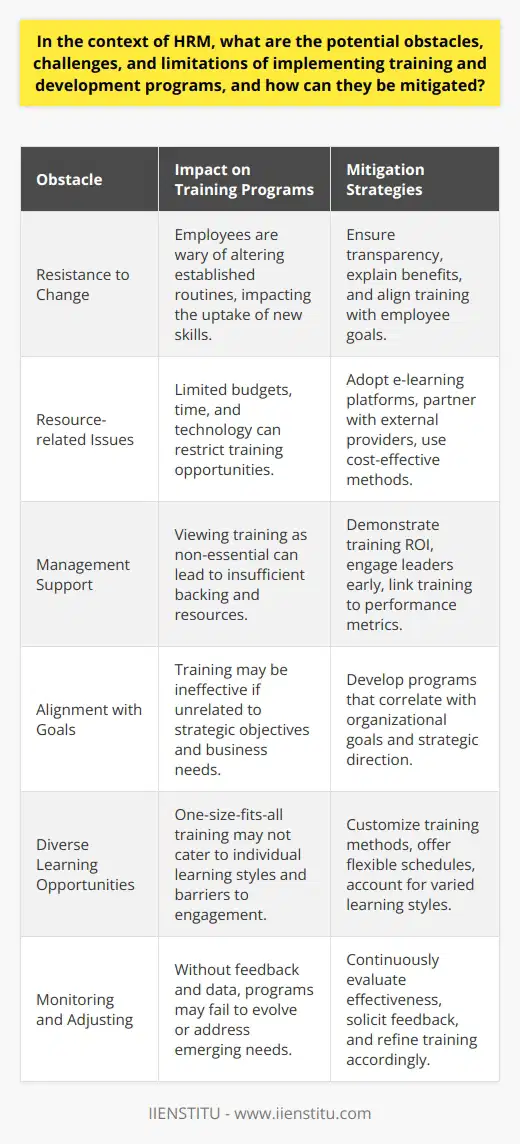
What is the impact of organizational strategy on training and development in HRM?
Organizational Strategy's Influence on Training and Development
The organizational strategy greatly impacts training and development in Human Resource Management (HRM). This strategy provides the blueprint for how an organization operates and identifies the skills, knowledge, and abilities necessary to meet its objectives.
Emphasis on Skill Identification
The emphasis on skill identification helps HR identify the skill gaps within the workforce. Furthermore, this identified area becomes the primary focus of training and development initiatives. Hence, a well-defined organizational strategy acts as a driving force for specifying training needs and development activities.
Impact on Employee Learning
The influence of organizational strategy is also notable in the approach towards employee learning. Some organizations, focusing on continuous improvement, may promote ongoing learning among their employees. This continuous learning culture induces frequent training sessions, workshops, and seminars.
Alignment with Organizational Goals
Moreover, the strategy also ensures that training and development aligns with the company's goals and objectives. Consequently, employees receive training that not only builds their professional competencies, but also steers the organization towards its strategic vision.
Strategic Use of Resources
An effectively aligned strategy aids in the strategic use of resources in the HRM sphere. It ensures sensible investment on training programs that enhance the workforce's skills pertinent to the organizational goals.
In conclusion, the organizational strategy significantly impacts HRM, guiding the creation, implementation, and evaluation of training and development programs. Without it, organizations might face hindrances in cultivating a competent and well-skilled workforce, thereby affecting overall success.

How can HRM successfully incorporate training and development into the employee performance appraisal process?
Understanding Employee Training and Development
The incorporation of training and development into the employee performance appraisal process ultimately enhances overall staff performance in any organization. Human Resource Management (HRM) should customize training programs to address individual employees' weaknesses identified during performance appraisals.
Establishing Linkages between Appraisal and Training
Specifically, HRM should link appraisal outcomes with training and development strategies. Following the appraisal, HR shall recognize each individual's educational gaps and seek to establish specific training programs.
Tailoring Employee Development Programs
The creation of tailored training enhances personal growth and professional development. Plenty of growth opportunities motivates employees, increases job satisfaction, and helps retain top talent.
Promoting Continuous Learning
Training and development should be ongoing processes, not one-off events. HRM could successfully achieve this by embedding learning in everyday tasks and encouraging a culture of continuous improvement.
Monitoring Progress Post-training
Additionally, HRM should assess employees' behaviour and performance post-training to determine whether the training objectives were achieved. HR could do this by integrating progress monitoring within the employee performance appraisal system.
In conclusion, HRM can successfully integrate training and development into the employee performance appraisal process by recognizing educational gaps, creating tailored programs, promoting continuous learning, and monitoring progress. Such a comprehensive approach benefits not only employees but also the overall organization's productivity and effectiveness.
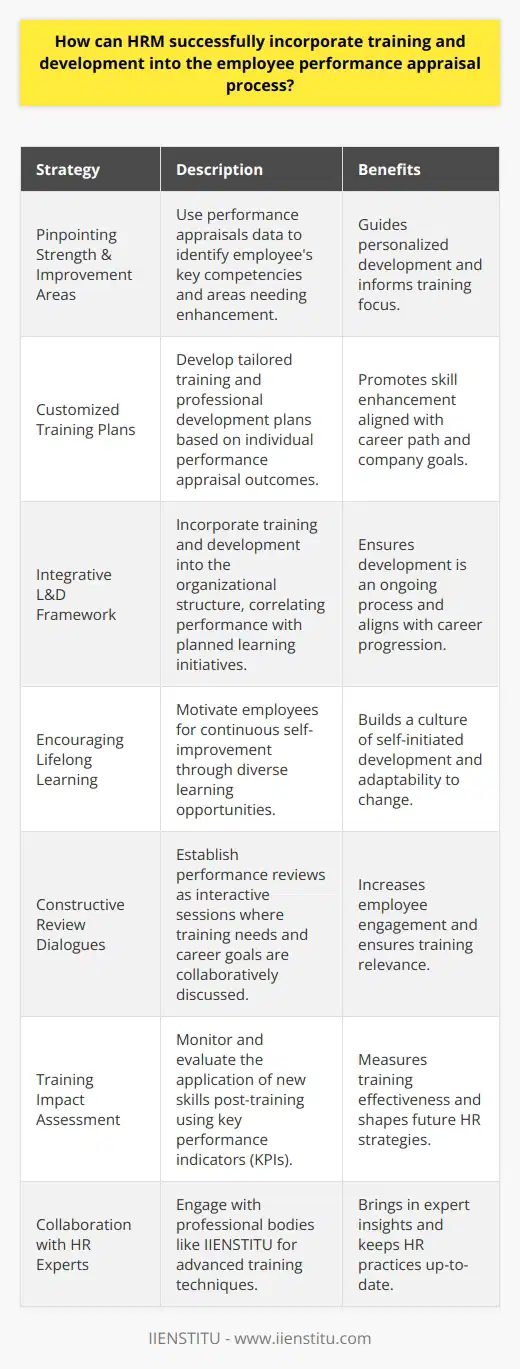
How do mentoring and coaching programs contribute to human resource development and complement other training initiatives in HRM?
Mentoring and Coaching Programs for HR Development
Mentoring and coaching programs play a vital role in human resource development. They allow employees to gain expert knowledge and learn new skills under the guidance of a more experienced colleague or external mentor. This supports continuous learning and adaptability in the workforce.
Complementing Other Training Initiatives
These mentorship programs complement traditional training initiatives, providing an additional level of practical knowledge and interpersonal confidence. They supplement formal training, harmonising technical curriculum with essential soft skills required in a professional setting. Success in the modern workplace depends on intertwining these different learning experiences.
Practical Application of Knowledge
The distinctive contribution of mentoring and coaching lies in its focus on application. While conventional training imparts knowledge, it often lacks a practical context. Mentoring fills this gap, offering a platform where trainees can apply their skills in a guided, yet real-life, professional environment.
Enhancing Employee Skill Set
Moreover, mentoring allows for the development of specific skills beyond the scope of standard programs. Through their experience and expertise, mentors help protégés to enhance their critical thinking, decision-making skills, problem-solving capabilities, and many other crucial soft skills that are not typically addressed in other training sessions.
Building Stronger Professional Relationships
Besides skill development, the steady interaction between mentor and mentee nurtures stronger professional relationships. This relationship building is beneficial for creating a supportive work culture, facilitating enhanced communication, mutual respect, and improved employee satisfaction.
In conclusion, mentoring and coaching programs make a substantial contribution to human resource development. They add depth to the overall learning experience, formulating a more comprehensive and well-rounded training initiative. Thus, these programs play a crucial role in human resource management, elevating traditional training to a more holistic, impactful method.

